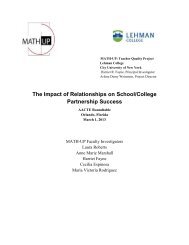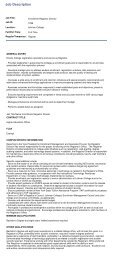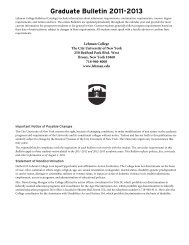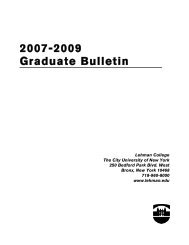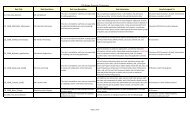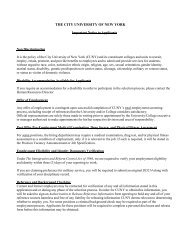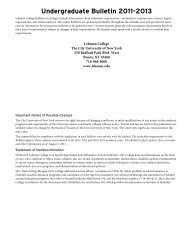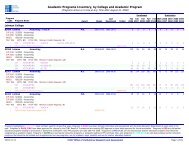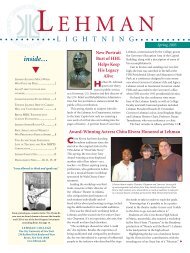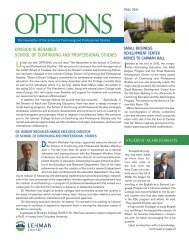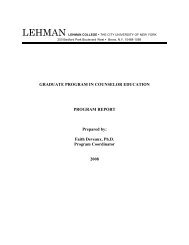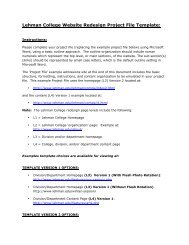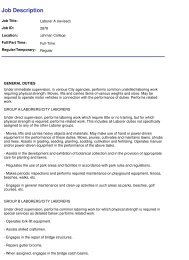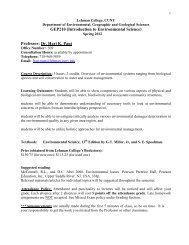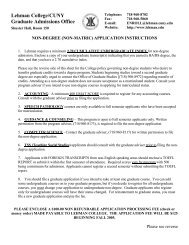Lehman Center Turns Thirty - Lehman College
Lehman Center Turns Thirty - Lehman College
Lehman Center Turns Thirty - Lehman College
Create successful ePaper yourself
Turn your PDF publications into a flip-book with our unique Google optimized e-Paper software.
Alumni Mentoring Network<br />
Reaches Out to Help <strong>Lehman</strong> Students<br />
When Kerri-Ann Campbell transferred to <strong>Lehman</strong> from<br />
Westchester Community <strong>College</strong> in 2008, a professor gave her<br />
some advice. “He told me to get myself a mentor,” she recalls.<br />
Which is exactly what she did.<br />
After contacting the Career Services <strong>Center</strong>, Campbell was quickly<br />
paired up with Nella Valentino (B.A., ‘05; M.A., ‘08), who works as<br />
an adjunct in the English Department. The pair immediately hit it<br />
off. “We talk all the time,” says Valentino. “It’s more like a big sister–<br />
little sister type thing than a mentor-mentoree.”<br />
Launched by the Career Services <strong>Center</strong> in 2007, the Alumni<br />
Mentoring Network has served as a resource for <strong>Lehman</strong> students<br />
who face a range of issues, from the easily remedied to the more<br />
complex, such as acclimating to a college environment, choosing<br />
between two or more career paths, or fi guring out the best road<br />
to success in a particular career. In each of these cases, students<br />
can benefi t from the guidance, insight, and support of an<br />
alumni mentor.<br />
For Campbell, who is scheduled to earn her B.B.A. in marketing<br />
in 2011, Valentino has been there to help her with anything<br />
she needs, whether it’s grades or personal advice. But<br />
the one thing she says Valentino always suggests is that she<br />
stand up for herself. “She tells me to ask the professor a lot of<br />
questions, and it totally helps,” she explains. The pair speaks<br />
by phone and regularly emails each other. They also see each<br />
other on campus. Adds Valentino: “We talk about whatever<br />
she wants to talk about: school, grades.”<br />
After two years of mentoring, Campbell is ready to move on,<br />
which is somewhat bittersweet. “I’m sad to see it end,” she<br />
says, “but I know that we’ll stay friends.”<br />
New Dean Hosts Reception for<br />
Arts and Humanities Alumni<br />
A reception for Arts and Humanities alumni, hosted by Dean<br />
Timothy Alborn, brought alumni from various years and majors to<br />
the Leonard Lief Library last spring, just in time to catch an exhibit<br />
on Abraham Lincoln, as well as a performance of “A View from the<br />
Bridge,” being produced on campus by the Theatre Program.<br />
Examining Lincoln’s gradual transformation from an antislavery<br />
moderate into “The Great Emancipator,” the display featured<br />
reproductions of rare historical documents, period photographs,<br />
and illustrative materials, drawing upon original documents in the<br />
collections of the Huntington Library and the Gilder Lehrman<br />
Institute of American History.<br />
Surrounded by the exhibit, faculty members from a number of<br />
departments, including African and African American Studies,<br />
26 <strong>Lehman</strong> Today/Fall 2010 – Winter 2011<br />
The mission of the Career Services <strong>Center</strong> (CSC) at <strong>Lehman</strong><br />
is to assist students and alumni with all phases of their career<br />
development and help them transition from college to career.<br />
CSC strives to provide the highest quality of comprehensive<br />
services, allowing students to successfully meet the challenges<br />
of a globally competitive job market. Over the last academic<br />
year, the <strong>Center</strong> has had over 600 visits from alumni who<br />
needed assistance with various career-related issues.<br />
The Career Services <strong>Center</strong> is always interested in recruiting<br />
<strong>Lehman</strong> alumni who would like to work with the <strong>College</strong>’s students.<br />
If you would like to participate and help shape the lives<br />
of the next generation, please contact Navisha Maharaj, the<br />
alumni mentoring coordinator, at 347-577-4009 or via email<br />
at navisha.maharaj@lehman.cuny.edu.<br />
Kerri-Ann Campbell, right, with her mentor Nella Valentino.<br />
From left to right: Joan and<br />
Ron Brown, Dean Timothy<br />
Alborn, and Paul Ramirez.<br />
English, and History, welcomed back their former students and<br />
caught up on each other’s lives since graduation. History major<br />
Carmen Guzman (B.A., ‘97) said afterward that “we need more<br />
events like this one, so we can get to see old friends and professors<br />
and hear what’s new at <strong>Lehman</strong>.” Paul Ramirez, a fellow<br />
history major who graduated just a year later (B.A., ‘98)—and then<br />
returned later for his master’s (M.A., ‘08)—said he had “met some<br />
very good scholars” and agreed it was “a great opportunity to see<br />
some of my old mentors again.”<br />
alumni spotlight<br />
Playwright, Director, Theatre Professor<br />
Dr. David Willinger ’72, ‘75<br />
Learned What He Was ‘Born to Do’ at <strong>Lehman</strong><br />
Dr. David Willinger<br />
When Dr. David Willinger (B.A., ‘72; M.A., ‘75)<br />
was accepted to <strong>Lehman</strong> in 1968, he had<br />
barely heard of it. A lifelong resident of Manhattan’s<br />
Upper West Side, he applied through<br />
CUNY Central and was informed he was<br />
accepted to <strong>Lehman</strong>. “I thought, ‘Okay, fi ne.<br />
That’s where I’ll go’,” he says, although he was<br />
not sure what to expect.<br />
Looking back, he considers his time at<br />
<strong>Lehman</strong> “as the happiest days of my life.<br />
Those were eventful years. I did a lot of my<br />
growing up at <strong>Lehman</strong>.”<br />
A playwright and theatre director, and a theatre professor at the<br />
City <strong>College</strong> of New York (CCNY), Dr. Willinger credits <strong>Lehman</strong>’s<br />
faculty with changing his life. “I had great professors: Arlen Digitale,<br />
Bob Engstrom, and Albert Bermel—I could never be grateful<br />
enough,” he says.<br />
A few months away from graduation, he had a chance encounter<br />
with Professor John Wilson that altered the course of his career.<br />
Asked if he had thought about graduate school, he admitted he<br />
hadn’t even considered it and planned to continue the acting career<br />
he had begun at the age of ten.<br />
Professor Wilson told him to apply for a teaching assistantship.<br />
He did just that and was back at <strong>Lehman</strong> the following semester,<br />
teaching two classes while pursuing his M.A. in theatre. “It was at<br />
Dennis Goode, ‘72, Publishes<br />
A Story that ‘Had to be Told’<br />
When Dennis Goode (B.A., ‘72) looks back at <strong>Lehman</strong>, he can’t help<br />
but remember the good times. “I was always out on<br />
the big green playing my guitar,” he says fondly. But<br />
those years—1968-1972—coincided with one of the<br />
most turbulent periods in American history. Political<br />
turmoil and serious discussions over the Vietnam War<br />
were a constant thread of campus life. “We were part<br />
of a collegiate voice that was sounded all across the<br />
nation,” he notes.<br />
In his courses, Goode discovered a lifelong passion for literature,<br />
as well as for writing and teaching, and praises professors like Ann<br />
Humpherys—”she gave me a deep love for Victorian lit.” After graduation,<br />
Goode taught English at JHS 136 in the Bronx, before he and<br />
his wife moved to Cape Cod, where they lived for more than twenty<br />
years. Along the way, he published both poetry and short stories.<br />
<strong>Lehman</strong> that I discovered what I was born to do: teach,” he says.<br />
He would go on to earn his Ph.D. in theatre from the CUNY<br />
Graduate <strong>Center</strong>.<br />
In addition to his teaching appointment at CCNY, Dr. Willinger<br />
has been active in both theatre and fi lm. His play “Andrea’s Got<br />
Two Boyfriends” has been performed throughout the U.S., and his<br />
theatrical adaption of Carson McCullers’ 1940 novel The Heart is a<br />
Lonely Hunter was staged at the Avalon Theatre in New York and<br />
Theatre for the New City. He also has published books and articles<br />
on Belgian theatre.<br />
Even now, the lessons learned at <strong>Lehman</strong> are with him as he embarks<br />
on new projects, such as a production of Hanoch Levin’s play<br />
Job’s Passion at Theater for the New City and a recent feature fi lm,<br />
Lunatics, Lovers and Actors, which he wrote and directed. The fi lm<br />
had its world premiere in June at the New Hope Film Festival.<br />
Shot on location at CCNY and St. Nicholas Park in Harlem, with<br />
a cast of sixty—half of them students—the fi lm is a reimagining of<br />
A Midsummer Night’s Dream, with the title taken from one of its<br />
lines. As in the Bard’s original play, the fi lm’s characters are forced<br />
to reassess their prejudices of one another. Instead of being set<br />
in ancient Athens, however, the fi lm takes place in modern Kuwait,<br />
where a born-again Christian falls in love with a Muslim, and a gay<br />
man transfi xes a homophobe.<br />
“I remember that when we fi nished it, I worried, ‘Oh, what if the<br />
fi lm becomes dated’,” he says. “But given recent events”—like the<br />
Mosque controversy in lower Manhattan—“I don’t think it’ll be dated<br />
any time soon.”<br />
Relocating to Las Vegas in 1994 to be closer to his wife’s parents,<br />
he taught English and worked as co-director of the Southern Nevada<br />
Writing Project at the University of Nevada. He also began thinking<br />
about his hometown and living in an apartment building like his<br />
former home in Brooklyn’s Flatbush section.<br />
Soon he found himself writing a story about two friends, their old<br />
neighborhood, and the lives of people they see every day. “It dawned<br />
on me that lives could pass by in front of your window, and you never<br />
know what they’re about,” he says. “It was a story I had to tell.”<br />
That story developed into his novel Time Squares (available both at<br />
amazon.com and www.createspace.com/3391908). His technique<br />
is to use very little dialogue “because I let the scenes and situations<br />
speak for themselves. It explores the nuances of freedom, and we<br />
recognize a bit of ourselves in all the characters.”<br />
<strong>Lehman</strong> Today/Fall 2010 – Winter 2011 27



